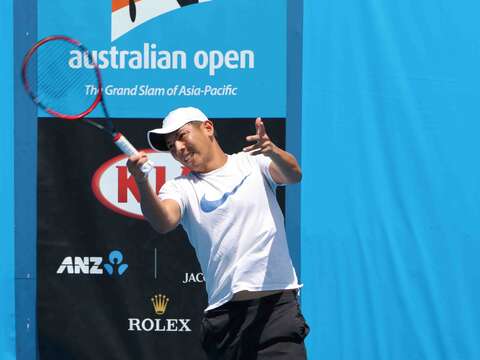Post date:2016-07-11
Updates:2016-08-23
1558
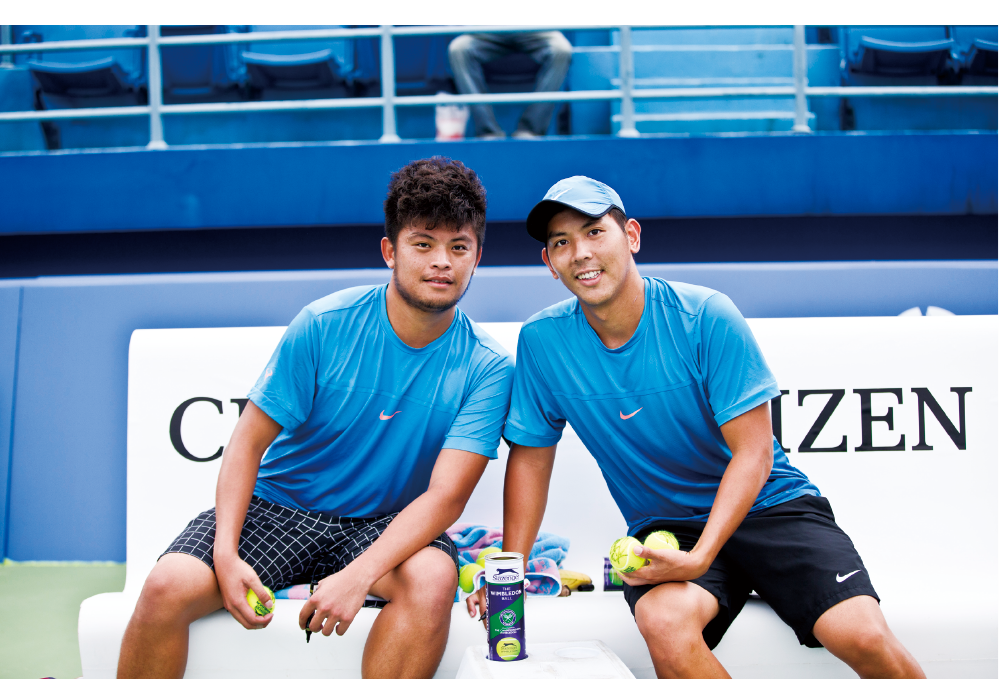 Article _Xie Yingjie
Article _Xie Yingjie Photos _ Tsung-Hua Yang
At age 9, Tsung-Hua Yang (楊宗樺) first came in contact with tennis. By age 10, he had already become national champion. By the age of 14, he was competing overseas. At the age of 17, in one fell swoop he won three Grand Slam tournaments on the juniorcircuit, including the Australian Open, French Open, and Wimbledon. That same year, he was named the International Tennis Federation (ITF) Junior World Champion, and achieved a number one world ranking. Yang is an extraordinary athlete, whose boundless talent was manifest early on.
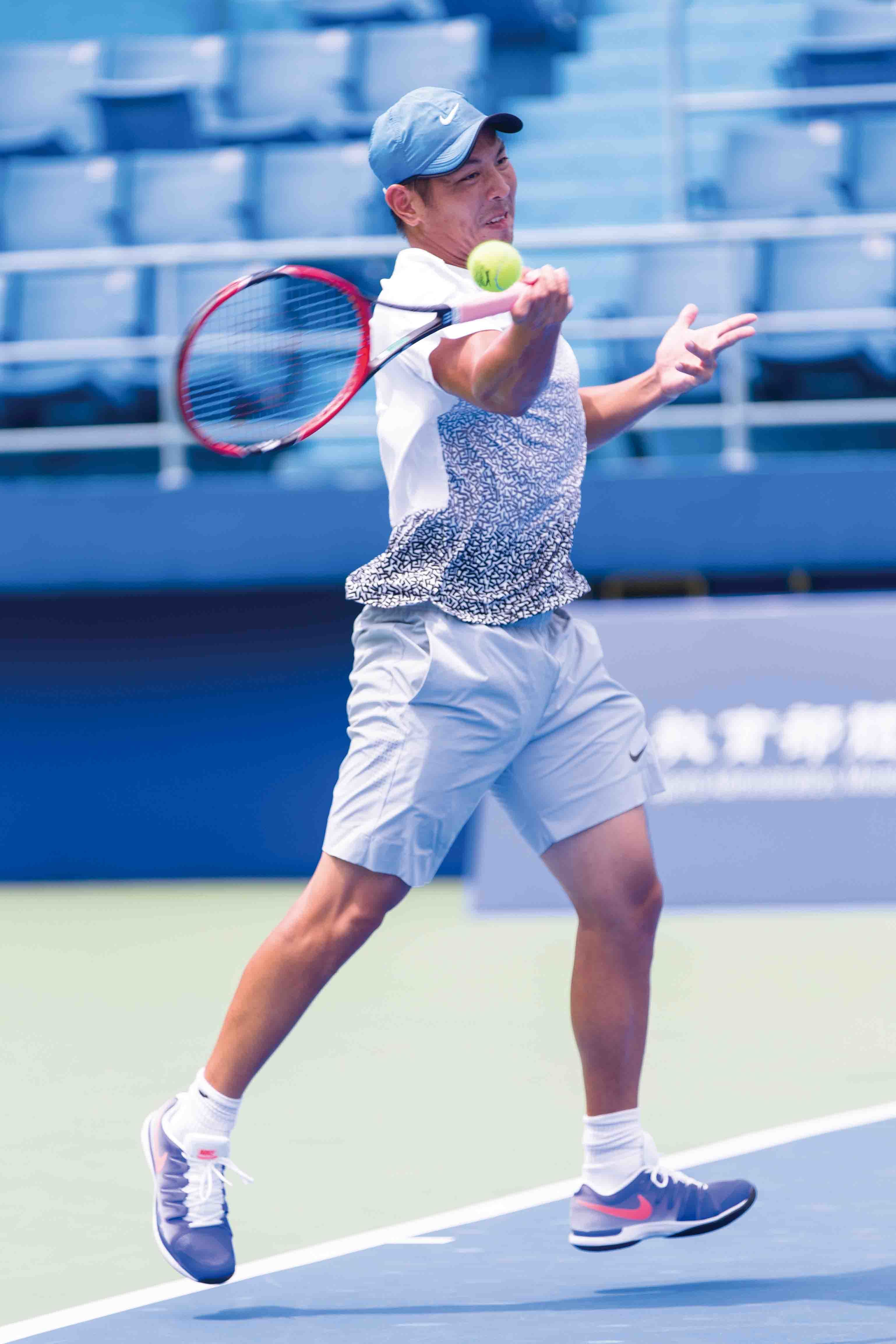
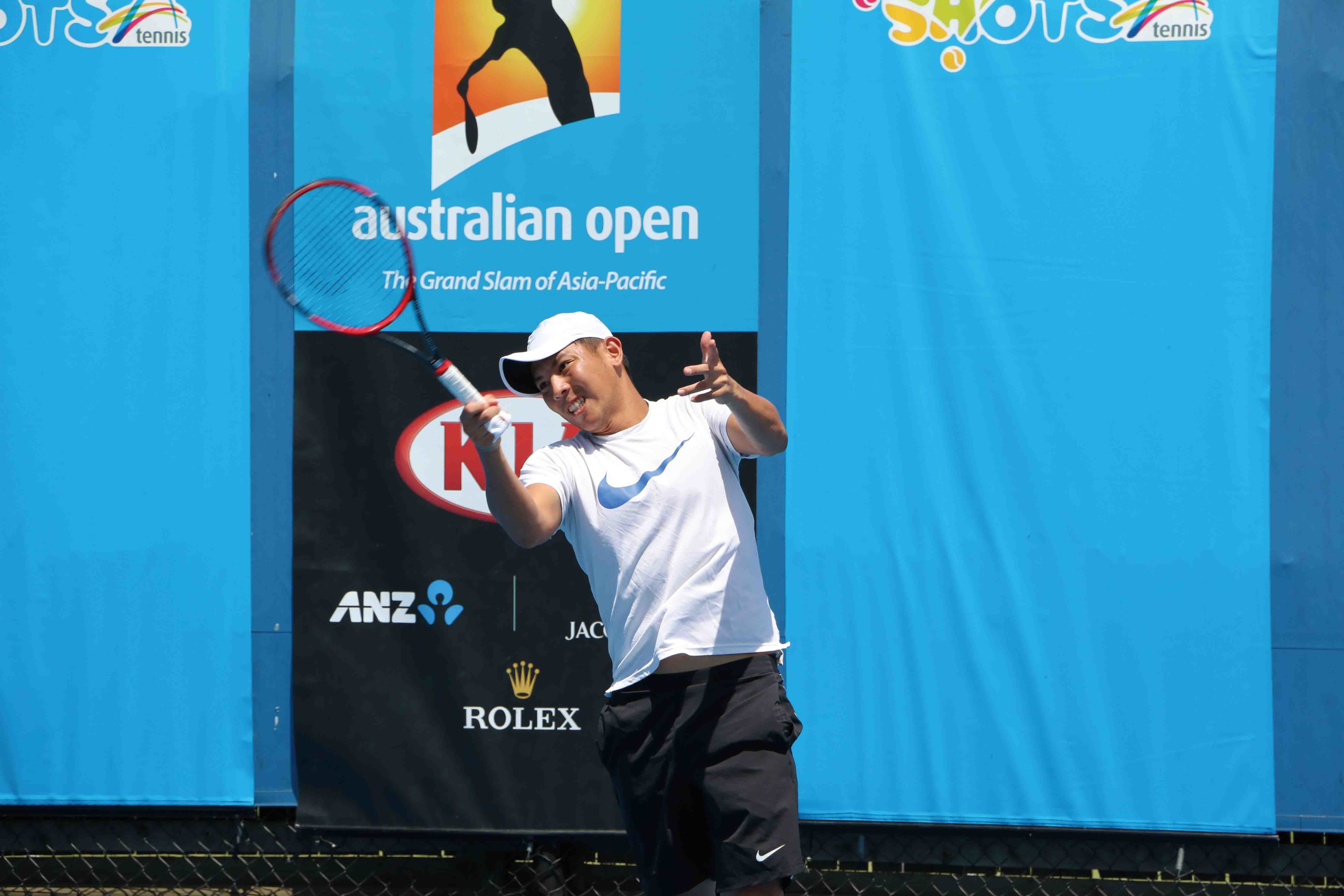
1-2. At this year’s Australian Open, Tsung-Hua Yang played with a torn ligament in his pinky finger, binding
two fingers together with white adhesive tape during training and competition, demonstrating impressive willpower.
After turning pro in 2009, Yang’s highest men’s professional singles world ranking has been 164th. He is currently ranked 210th. His highest men’s professional doubles ranking has been 144th. Currently, he is ranked 230th. At the 2015 Summer Universiade in Gwangju, South Korea, he won a silver medal as part of Taiwan’s men’s team and a bronze medal in men’s singles. At the 2017 Taipei Summer Universiade he will once again wear the national team uniform, and proclaims that, “I want to keep the gold medal in Taipei!”
Traveling Far and Wide to Fulfill His Dream, Gaining Maturity From Experience
At a height of 178 centimeters and a weight of 80 kilograms, Yang has been nicknamed “Little Fatty” (小胖). He does not in fact appear in any way overweight, instead looking rather like a tanned, active and ruggedly handsome beachgoer. He says that,“When I was little, I was more rotund. Friends would call me ‘Little Fatty.’ To help us lose weight, my family sent my older brother and I to a summer tennis camp. My brother didn’t continue to practice, but my interest grew, and I’ve been playing ever since.”
Yang has been flying to different countries to compete since he was 14, sometimes accompanied by his coach and sometimes alone, carrying his own tennis bag, fighting to fulfill his dream. Compared with most other young people of the same age, he has had much richer experiences, and received much stricter physical and psychological training. He notes that, “Because I came in contact with society early on, it is possible that I am more mature,
and better understand how to deal with crises.”
His first long journey on his own was to France. At that time, he was so nervous on the plane that he cried. He kept thinking to himself that, “When I get there, there will be no one there who I know. What should I do?” He was very young, and his English was inadequate. Although there was a foreign coach who came to his aid, he still felt great pressure. Yang says that, “For that reason, from that time on I had more determination to study English. Communicating using gestures was very inconvenient.”
Each year, Yang spends almost 11 months competing in various countries. Although he comes home, it is usually just to rest for a few days before having to fly somewhere else. One experience that has left an especially deep impression was while training and competing in Brazil. In the middle of the night, while sound asleep in a hotel, he heard a loud explosion. “A loud boom suddenly woke me up,” he says. “I thought it was a terrorist attack. I quickly grabbed my passport bag and ran out of the room. When I got downstairs, I saw that everyone was dressed as if they had just gotten out of bed. There was a lot of confusion. We found out later that it had been a natural gas explosion. It was frightening, but thankfully no one was hurt.”
Yang’s teeth have been his “Achilles heel” when competing overseas. Once, when in Thailand, he had to have one of his wisdom teeth removed. On another trip to Vietnam, he needed a root-canal procedure. On both occasions he was in unbearable pain, and had to hurriedly find care locally. He says that, “When I was in Thailand, I went to a very good hospital, and received a great shock when presented with the bill. To have one wisdom tooth pulled cost more than NT$10,000. The facilities in Vietnam were not so advanced, but I found a good dentist who provided emergency care so that I could play.” When overseas, Yang has to figure out how to solve problems on his own. He once again emphasizes that, “It is necessary to be able to communicate in English.”
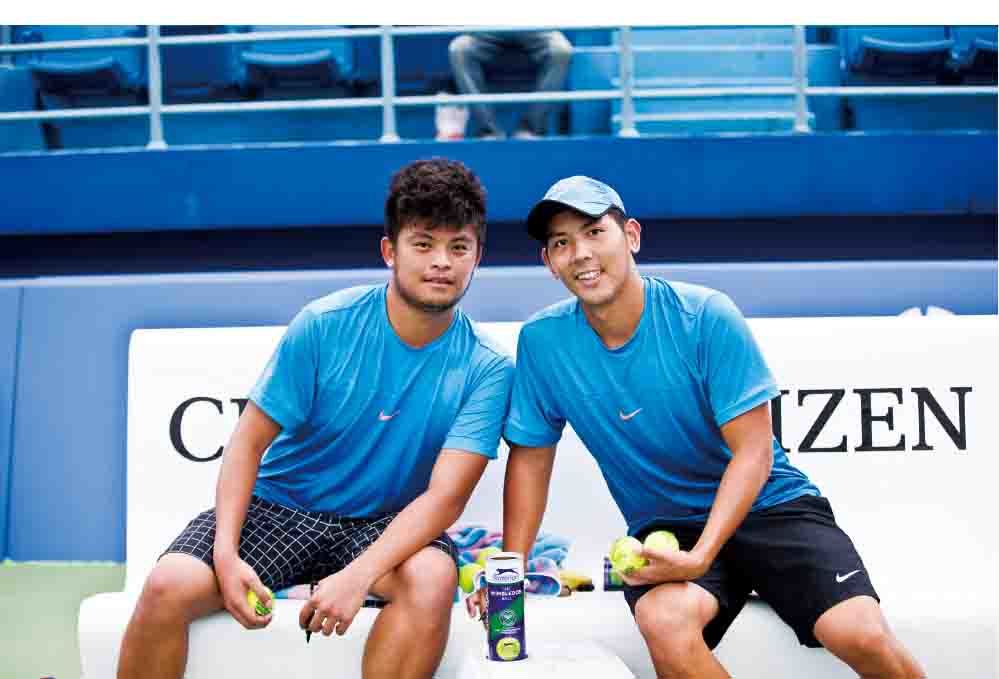
3. “Little Fatty” Yang (right) and “A Peng” Hsieh (left) have great tacit understanding on the court; the “Fatty Peng” duo will compete shoulder to shoulder at the 2017 Taipei Summer Universiade.
Bravely Entering Grand Slam Tournaments, First Australian Open Experience
At the beginning of this year, in the Australian Open, Yang and Cheng-Peng Hsieh (謝政鵬) won the Asia-Pacific region men’s doubles wildcard playoff to advance on the men’s doubles event. Returning to the place where he had contended for the junior championship in his youth was deeply meaningful for Yang. He says that, “At the Australian Open, I thought about the glory of eight years ago. This gave me more encouragement to play well.”
International competitions test the ability of athletes to resist pressure. Yang says that every athlete is nervous, and of course before a match he is too. But once on the court he becomes focused on what he is doing – for example, on how to hit the next ball, and the next step in his strategy. “For sure,” he says, “you do not want to keep thinking about how nervous you are on the court. It’s possible that your opponent is even more nervous than you.”
His showing at his first Australian Open since turning pro was less than ideal. After the tournament, Yang critiqued his performance. “I played too impetuously, and was not as steady as my opponents.” Actually, however, he was forced to play with an injury, a torn ligament in his pinky finger. “I was not able to exert force on my pinky finger,” he explains, “so I taped the last two fingers together, to better bind it in place. I felt bad for my partner, but no matter what I had to hang on and finish playing.”After returning to Taiwan, he underwent surgery to repair the ligament at National Taiwan University Hospital. Currently recovering well, he’ll start competing again soon.
Though not able to advance at the Australian Open, the always thoughtful Yang made a special effort to bring back towels and souvenir key chains to offer as prizes to fans on his Facebook Fans Page, sharing his joy at participating in this classic tournament. He says that, “My online fans leave very warm messages, and having people support me this way gives me encouragement!”
Sparing No Effort to Prepare for the Universiade, Contending for Gold for Taiwan
“Little Fatty” Yang and “A Peng” (A鵬) Hsieh form the “Fatty Peng doubles team” (胖鵬配). Long-time partners in Taiwan’s men’s doubles competitions, they’ll once again compete shoulder to shoulder at the 2017 Taipei Summer Universiade. Of the tacit understanding between these two, Yang explains that, “We have a common strength – that is, if we lose we don’t blame each other.”
He adds that, “Many doubles partners eventually part company. Perhaps it is because one day they lose a tournament and they blame each other for not playing well enough. This creates a feeling of animosity. But, for every person, each day is a different situation, and we will show understanding toward one another. After teaming up for such a long time, we are very comfortable and at ease with one another.”
Every morning, Yang wakes up at seven to begin his physical training. He explains that, “With the urging of my physical fitness coach, there is no room for slacking off. I spare no effort in working to fulfill whatever demands my coach makes, so that I can maintain myself in the best possible shape.” He has an outgoing personality with nerves of steel, able to adjust his attitude whether winning or losing, and after many years of competition has gradually gained in maturity. Yang notes that, “If I don’t play well, of course I will feel upset at first. But after two or three hours, I can completely recover.”
He adds that, “Because we compete through most of the year, we cannot win every match. If we lose, we need to figure out why, and then quickly work to improve.” Yang believes that one of the most attractive things about tennis is that the ball is round; no one can win for sure each time. “Even if there is a large difference in rankings, a player ranked in the top 50 can possibly lose to a player ranked 200th or 300th. No matter your opponent, you cannot let your guard down, and must carefully respond to the challenge.”
His preparation strategy for the 2017 Universiade is a packed competition schedule, allowing“competition to take the place of training.” Yang explains that, “Through competition, you fulfill training objectives. Thus, A Peng and I are competing together in numerous targeted tournaments.” Scheduled tournaments have included the Santaizi ATP Challenger in Taiwan, Uzebekistan F1 Futures Karshi (ATP Challenger Tour), and Open de Nice Cote d’Azur (ATP World Tour).
“Tennis is the most important thing in my life,” says Yang. “It will most likely stay with me all of my life.” It is as if tennis is the center of Yang’s circle. Surrounding his life of tennis are happiness, sadness, achievement, and lows. He notes that, “From the time of my youth, when I received the most glory, to the ups and downs following my turning pro, I have felt all sorts of emotions. Playing tennis is my dream. In the future, I hope that I can reach the semifinals or quarterfinals at one of the four majors, so that the world can see my accomplishments.”
To welcome the impending 2017 Universiade, the Taipei City Government has been providing comprehensive support to Taiwan’s athletes during their training. Of this, Yang expresses his gratitude. “Taipei is our home! When we are playing at home, we must perform well and keep the gold in Taipei!”
 TAIPEI 2016Summer Vol.04—Tsung-Hua Yang: Taiwan’s Tennis Powerhouse Pledging to Keep the Gold in Taipei
TAIPEI 2016Summer Vol.04—Tsung-Hua Yang: Taiwan’s Tennis Powerhouse Pledging to Keep the Gold in Taipei